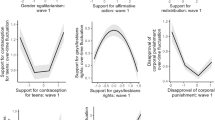Abstract
Using data from a panel survey of members of two generations, this study explores observed change in policy opinions across a 9-year span and respondents' recollections and explanations of their self-perceived attitude shifts. In general, remembrances corresponded poorly to opinions as originally expressed, with respondents perceiving that they were more attitudinally stable than was actually observed. When attempting to reconstruct their past political attitudes, individuals appeared to rely on simple rules of thumb such as one might employ to account for another's behavior. Finally, respondents readily supplied “explanations” for their self-perceived attitude history, even when those perceptions directly contradicted observed opinion change. It is argued that these results are not artifacts of survey measurement problems. Instead, they indicate that policy attitudes generally do not have strong cognitive representations, are eminently changeable, and once they are changed, an individual's cognitive autobiography is revised so as to render the changes invisible.
Similar content being viewed by others
References
Achen, C. H. (1975). Mass political attitudes and the survey response.American Political Science Review 69: 1218–1231.
Bem, D. J. (1972). Self-perception theory. In L. Berkowitz (ed.),Advances in Experimental Social Psychology, Vol. 6. New York: Academic Press.
Bem, D. J., and McConnell, K. H. (1970). Testing the self-perception explanation of dissonance phenomena: On the salience of premanipulation attitudes.Journal of Personality and Social Psychology 14: 23–31.
Converse, P. E. (1964). The nature of belief systems in mass publics. In David E. Apter (ed.),Ideology and Discontent, pp. 206–261. Glencoe: Free Press.
Converse, P. E. (1970). Attitudes and non-attitudes: Continuation of a dialogue. In Edward R. Tufte (ed.),The Quantitative Analysis of Social Problems, pp. 168–189. Reading, Mass.: Addison-Wesley.
Converse, P. E., and Markus, G. B. (1979). Plus ca change ...: The new CPS Election Study Panel.American Political Science Review (February) 73: 32–49.
Conover, P. J., and Feldman, S. (1984). How people organize the political world: A schematic model.American Journal of Political Science 28: 95–126.
Dalton, R. J. (1980). Reassessing parental socialization: Indicator unreliability versus generational transfer.American Political Science Review 74: 421–431.
Fagen, R. R. (1970). Cuba: The political content of adult education. In R. S. Sigel (ed.),Learning About Politics. New York: Random House. (Original work published 1964, Stanford: The Hoover Institution on War, Revolution, and Peace.)
Fiske, S. T., and Taylor, S. E. (1984).Social Cognition. Reading, Mass.: Addison-Wesley.
Goethals, G. R., and Reckman, R. F. (1973). The perception of consistency in attitudes.Journal of Experimental Social Psychology 9: 491–501.
Greenwald, A. G. (1980). The totalitarian ego: Fabrication and revision of personal history.American Psychologist 35: 603–618.
Hamill, R., and Lodge, M. (1984). Cognitive consequences of political sophistication. Paper presented at the 19th Annual Carnegie Symposium on Cognition, Carnegie-Mellon University.
Jennings, M. K. (1984). Residues of a movement: The aging of the American protest generation. Paper presented at conference sponsored by the Social Science Research Institute at Cadenabbia, Italy.
Jennings, M. K., and Markus, G. B. (1984). Partisan orientations over the long haul: Results from the three-wave political socialization panel study.American Political Science Review 78: 1000–1018.
Jennings, M. K., and Niemi, R. G. (1974).The Political Character of Adolescence. Princeton: Princeton University Press.
Jennings, M. K., and Niemi, R. G. (1981).Generations and Politics. Princeton: Princeton University Press.
Jones, E. E., and Nisbett, R. E. (1971).The Actor and the Observer: Divergent Perceptions of the Causes of Behavior. Morristown, N.J.: General Learning Press.
Kinder, D. R., and Sears, D. O. (1985). Public opinion and political action. In G. Lindzey and E. Aronson (eds.),The Handbook of Social Psychology (3rd ed.), chap. 25. New York: Random House.
Lau, R. (1984). Political schemas, candidate evaluations, and voting behavior. Paper presented at the 19th Annual Carnegie Symposium on Cognition, Carnegie-Mellon University.
Markus, G. B., and Jennings, M. K. (1985). Of Yuppies, Enddies, and the formation of political generations. Paper presented at the annual meetings of the American Political Science Association, New Orleans.
Markus, H., Crane, M., Bernstein, S., and Siladi, M. (1982). Self-schemas and gender.Journal of Personality and Social Psychology 42: 38–50.
Markus, H., and Sentis, K. (1982). The self in social information processing. In J. Suls (ed.),Social Psychological Perspectives on the Self. Hillsdale, N.J.: Lawrence Erlbaum Publishing.
Markus, H., and Zajonc, R. B. (1985). The cognitive perspective in social psychology. In G. Lindzey and E. Aronson (eds.),The Handbook of Social Psychology (3rd ed.), chap. 4. New York: Random House.
Moss, L., and Goldstein, H. (eds.) (1979).The Recall Method in Social Surveys. London: University of London Institute of Education.
Nisbett, R. E., and Wilson, T. D. (1977). Telling more than we can know: Verbal reports on mental processes.Psychological Review 84: 231–259.
Page, B. I., and Shapiro, R. Y. (1983). Effects of public opinion on policy.American Political Science Review 77: 175–190.
Pierce, J. C., and Rose, D. (1974). Nonattitudes and American public opinion: Examination of a thesis.American Political Science Review 68: 626–649.
Slovic, P., and Lichtenstein, S. (1971). Comparison of Bayesian and regression approaches to the study of information processing in judgment.Organizational Behavior and Human Performance 6: 649–744.
Smith, T. W. (1984). Recalling attitudes: An analysis of retrospective questions on the 1982 GSS.Public Opinion Quarterly 48: 639–649.
Smith, T. W., and Klaeser, D. L. (1983). Looking backwards: A summary of findings and recommendations.Historical Methods 16: 16–29.
Tversky, A., and Kahneman, D. (1974). Judgment under uncertainty: Heuristics and biases.Science 185: 1124–1131.
Wixon, P. R., and Laird, J. D. (1976). Awareness and attitude change in the forced-compliance paradigm: The importance of when.Journal of Personality and Social Psychology 34: 376–384.
Author information
Authors and Affiliations
Rights and permissions
About this article
Cite this article
Markus, G.B. Stability and change in political attitudes: Observed, recalled, and “explained”. Polit Behav 8, 21–44 (1986). https://doi.org/10.1007/BF00987591
Issue Date:
DOI: https://doi.org/10.1007/BF00987591




